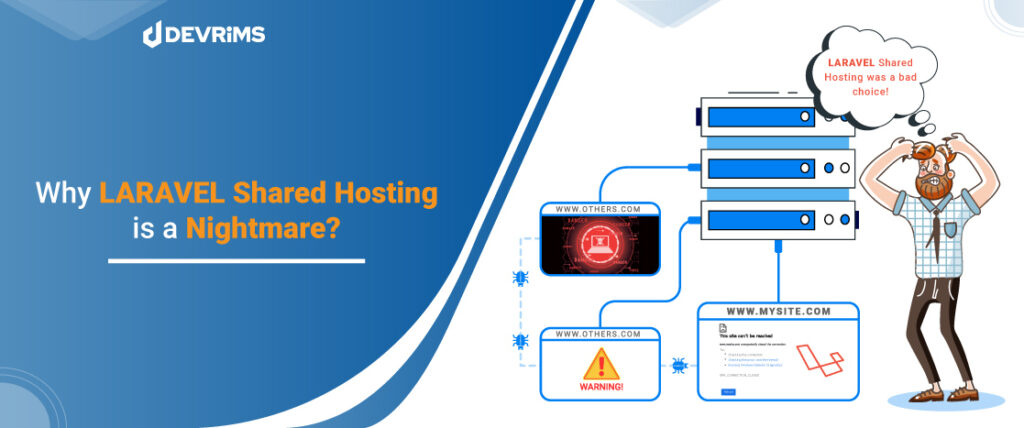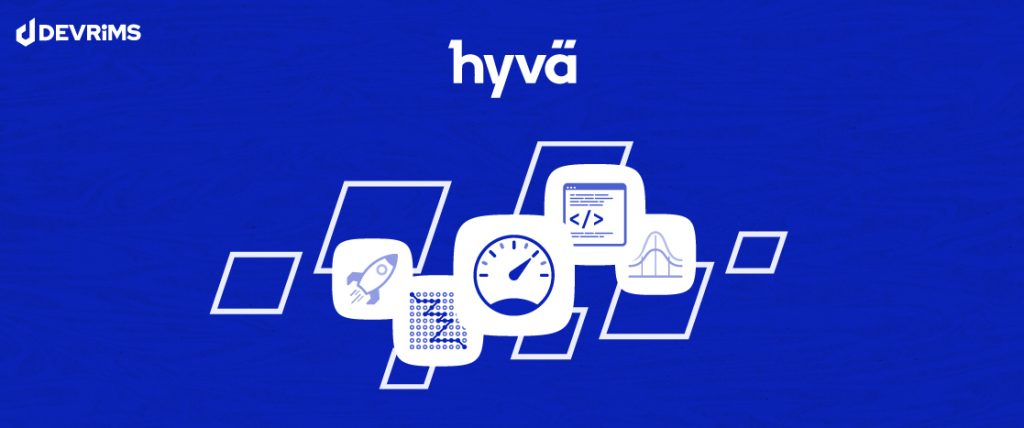Introduction
Laravel is an open-source Php web framework known for its easy-to-use syntax and boilerplate with great community support and technical documentation. Among different hosting options, Laravel shared hosting is cheap in cost with limited features. Unlike RAW Php apps and CMSs, you need a hosting plan that offers all the features and customization options in clicks because hosting Laravel requires custom configuration of deployed services and hosting servers according to project requirements.
In this article, I will explain why Laravel Shared Hosting is a nightmare, the most critical aspects you should consider in website hosting, and which hosting to choose. I strongly suggest reading this blog before making any decision.
Types of Hosting
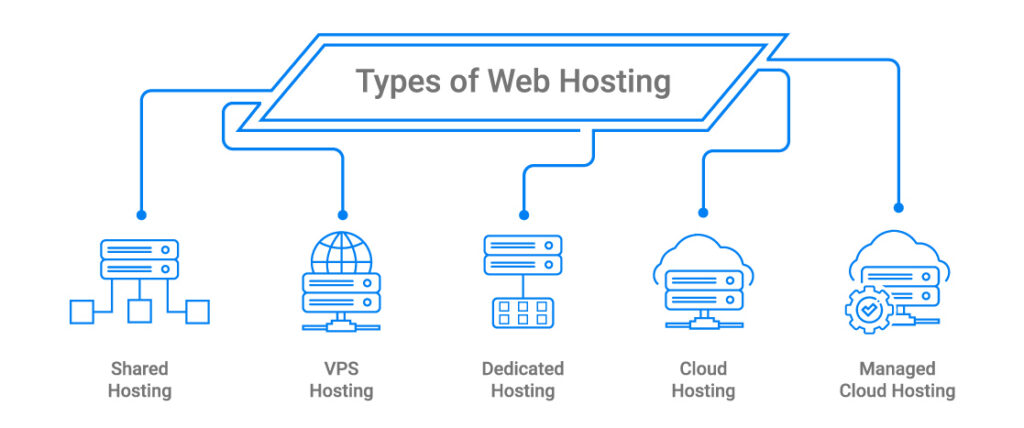
Web hosting is the most critical factor in your online presence because it ensures the website’s availability, performance, and security. There are numerous solutions in the domain of web hosting that will all put your website online.
Choosing the best web hosting plan isn’t just about price; it’s also about getting the correct level of resources and features to get your website up and running immediately without worrying about hosting management, speed, security and downtime.
Let’s shed some light on the different types of hosting available.
Shared Hosting
Shared hosting is a type of web hosting in which a single server is shared by multiple websites. Each website on the server is given a certain amount of resources, such as disk space and bandwidth, which it can use. Shared hosting is a cheaper option than other types of web hosting, such as dedicated hosting, because the cost of the server is divided among the websites that are using it.
Shared hosting is a good option for small businesses and individual websites that do not need a lot of resources. However, because the server is shared, it can be slower and less reliable than other types of hosting. If one of the websites on the server uses a lot of resources, it can affect the performance of the other websites.
Dedicated Hosting
Dedicated hosting is a type of hosting in which a server is leased or rented by a single client. The client fully uses the server and its resources and is responsible for all server administration with full control over the server, including its operating system, applications, and data.
Dedicated hosting is ideal for businesses with an in-house technical team with 24/7 support and high-traffic websites requiring many server resources. Dedicated hosting is much more expensive than shared hosting but offers more flexibility and resources.
Cloud Hosting
Cloud hosting is the on-demand availability of the remote server and different hardware resources for hosting your website. This allows for a more scalable, flexible and approach to hosting a website, as the server resources are highly scalable on hourly-based pricing. Cloud hosting is often used by businesses with technical resources to manage the cloud server and website hosting.
The adoption of cloud hosting is not practical for the majority of websites owners in terms of time and human resource costs.
Managed Cloud Hosting
Managed Cloud Hosting is an advanced form of cloud hosting where the hosting provider is responsible for cloud server management and website hosting.
This type of hosting is widely used by businesses, developers, and eCommerce that do not have the resources or expertise to manage a cloud server independently. The third-party provider manages the server, including monitoring, patching, server security and backups.
Managed Laravel cloud hosting can be an excellent option due to its flexibility, scalability, and features.
Blazing Fast Laravel Hosting
What is Laravel Shared Hosting?
With the growing popularity of the Laravel framework, many hosting companies are stepping into the market with different types of hosting services. One of its types is Laravel Shared hosting, where hosting server resources are shared between different websites of multiple users resulting in a low-cost solution.
Cost is the main factor motivating the website owners to use shared hosting for Laravel deployment. Since shared hosting is significantly less expensive than cloud and managed cloud hosting, not all users know the distinction between a managed cloud VPS and shared hosting. Usually, users host Laravel on shared hosting without much considering the post-deployment issues, scalability, security, consistent performance, and customization of the hosting server.
A Laravel application demands a dedicated server for consistent performance, which is not provided by shared hosting. The other major issue in shared hosting is the lack of security and features that you need to easily manage the live application on clicks. So it would be best to explore how to reduce those risks immediately and find the best Laravel hosting before it creates significant missed productivity or business loss.
14 Reasons Why Laravel Shared Hosting is not Good
I’ve seen numerous tutorials where writers explain how to deploy Laravel on shared hosting, but they eventually discourage doing so. Other writers noted security risks, performance issues, and frequent server-related errors, among so many other things. But what are the main reasons we should avoid installing Laravel on shared hosting? Let’s dive deeper into those reasons.
1) Inconsistent Performance
Performance is the core factor in reducing the bounce rate and improving the user experience. On shared hosting, the performance is average, but often, the performance score is less than 25% which is very bad.
The major reason for inconsistent performance is resource sharing between the different websites; you don’t know the peak traffic hours and traffic load of those websites. If other websites on the same server consume a lot of resources, your Laravel Project on Shared Hosting may suffer.
Another issue is the deployed software services are not optimized and configured according to project requirements because the same software service serves hundreds of websites on fixed configuration. This can result in poor page loading times and errors when accessing specific parts of your website.
2) Downtime Issues
Website downtime issues can be frustrating for both website owners and visitors. When your Laravel website is down, it can mean lost opportunities and website reputation, as well as a loss of access to critical information. Several things can cause uptime issues, from technical problems to malicious attacks. Website owners/developers must consider the best server for Laravel and need to be aware of potential causes of uptime issues.
3) Poor Security
Security is above all !! One of the major downsides to shared hosting is that it can often lead to poor server security. A compromised website means losing your online existence and customer data, resulting in business loss and user privacy issues.
This is because when multiple users share the same server, tracking who has access to what can be challenging. It can lead to sensitive information being leaked or stolen, making it easier for hackers to access the server. To avoid these problems, it is essential to know the security risks associated with shared hosting.
4) Not Reliable
Shared hosting is not reliable for many reasons. If one website on the shared server receives a lot of traffic, it can slow down the server for everyone else; if the shared server is not maintained correctly, it can become slow and unreliable; if the hosting provider oversells the server, it can become overloaded and cause problems for everyone; or if the hosting company does not have a good reputation, it can be challenging to get help if something goes wrong.
5) Not Scalable
Server scalability is a major issue of Laravel shared hosting for websites that experience traffic spikes in a few hours or a few days like eCommerce website visitors increase in high numbers during the sale season.
It can be a bottleneck if website owners run Laravel on shared hosting, limiting hosting package upgrades with cost adjustments. To improve the performance of your website, you will need to upgrade a server to a higher plan to get more resources, which is once again not possible on shared hosting or limited.
6) More Data Loss Cases
This is a severe issue! The possible causes of data loss are due to server-side damages and security issues. By being aware of these potential causes of data loss and hosting the Laravel project on shared hosting, you are in danger of losing the data.
7) SSH Access
When you deploy Laravel on shared hosting, you’re not usually given the option to access your websites via an SSH terminal. Also, these service providers typically don’t offer source code versioning support, so developers will often have limited options when making changes to existing sites or cannot run composer, artisan, or CLI commands.
8) Cron Jobs
A cron job is a time-based task set to run at a specific time or interval. Many shared hosting providers do not offer a cron job feature to schedule tasks to be run automatically. This can be very challenging for the developers to host Laravel on shared hosting and perform tasks that need to be run regularly via cron jobs, such as backups, or for tasks that need to be run at a specific time.
9) No Automatic Backup
If you’re using shared hosting, you’re likely not getting automatic backups of your website; you’re putting yourself at risk of data loss. This means that if something goes wrong, you could lose all your data with no way to get it back. Ensure you’re making regular backups of your Laravel project to avoid this potential disaster.
10) Additional Services
Another downside to hosting Laravel on shared hosting is when it comes to installing or configuring other software services. For example, you may not be able to install custom packages, additional software services, or specific software on a shared server.
11) Multiple Database Services
You might want to use multiple database services in shared hosting for many reasons. For example, you need MongoDB or ElasticSearch for your websites, or you might need multiple databases for a single website. The shared hosting provider does not offer multiple database services.
Luckily, some shared hosting offers several databases of MySQL or MariaDB in their plans. Still, you must ensure they have an updated database version that your Laravel application requires.
12) Server-Level Caching
Server-level caching will improve a website’s performance by reducing the time it takes to load pages. Shared hosting providers do not provide server-level caching services according to your website requirements.
In Laravel shared hosting, you can’t install and configure server-level caching like Redis, Memcached, etc., in a few clicks, resulting in a slow page speed.
13) Blocked Website Access
A shared hosting service host hundreds of websites on a single server. Suppose one of these websites contains harmful material, malicious scripts, content violations, or legal issues. In that case, the hosting server IP will be blocked by ISPs, blacklisted in different search engines like Google and access to all the websites on the server will be blocked.
14) Take It or Leave It Kind of Deal
Shared hosting does not support customization or any special requirement; it’s like you take it or leave it. Deploying Laravel on shared hosting is not a piece of cake. You could come across many hurdles. So before making a decision, you need to consider the points mentioned above and choose the best laravel hosting that meets your Laravel project requirements.
How to deploy Laravel on Shared Hosting?
Shared hosting is an option for people seeking low-cost hosting solutions. There are several shared hosting providers with whom you can deploy your Laravel project. Laravel deployment on shared hosting poses multiple challenges, including security threats, performance issues, limited functionalities, and no access to an SSH terminal. The procedure is not the same as uploading other web files to shared hosting; you must make certain changes.
Let’s take it one step at a time to deploy Laravel on shared hosting.
- Create a zip, tar, tar.gz compressed file of your Laravel project folder.
- Log in to your cPanel to deploy the Laravel 8 project on shared hosting.
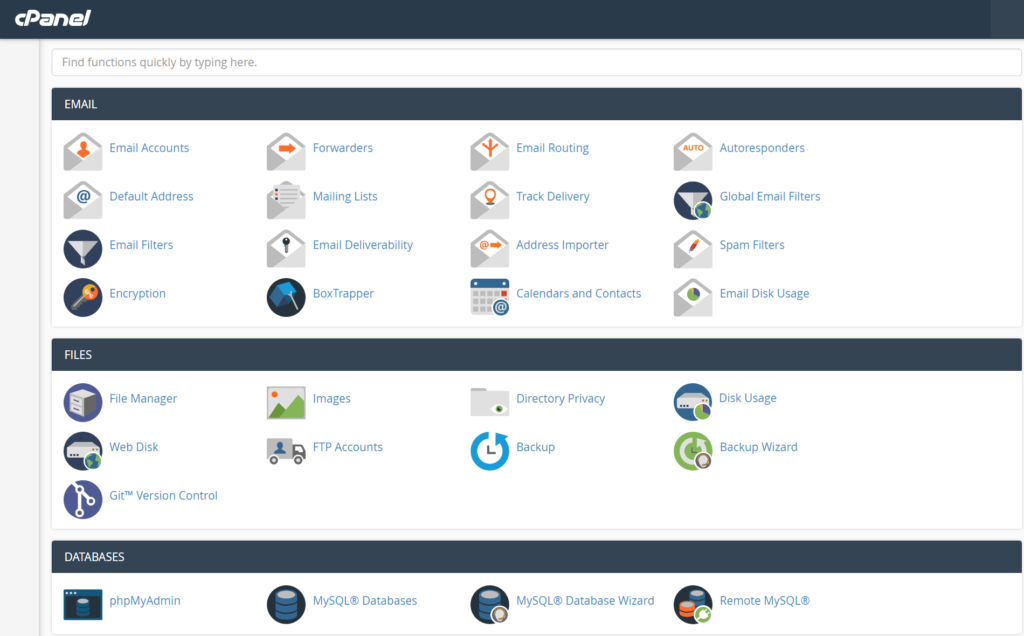
- Click on File Manager > public_html > Upload
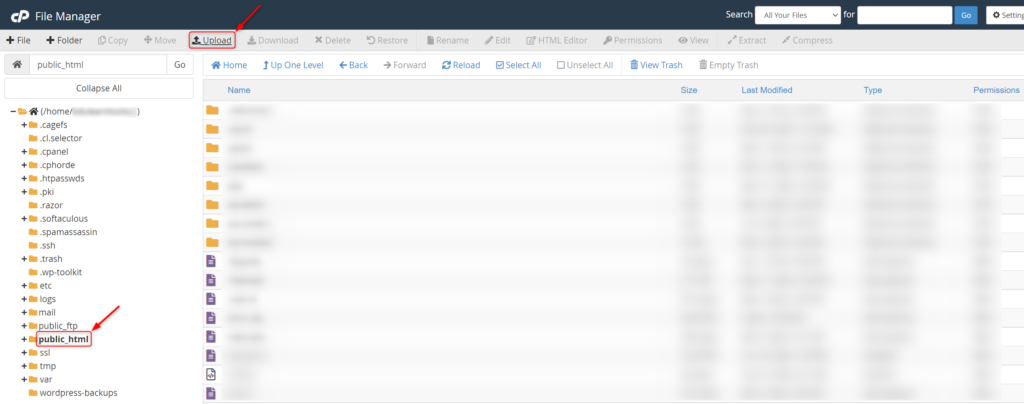
- Select the compressed file to upload inside the public_html root directory.

- Extract the compressed file inside the public_html
- Look for the index.php file, right-click on it, and click Edit.
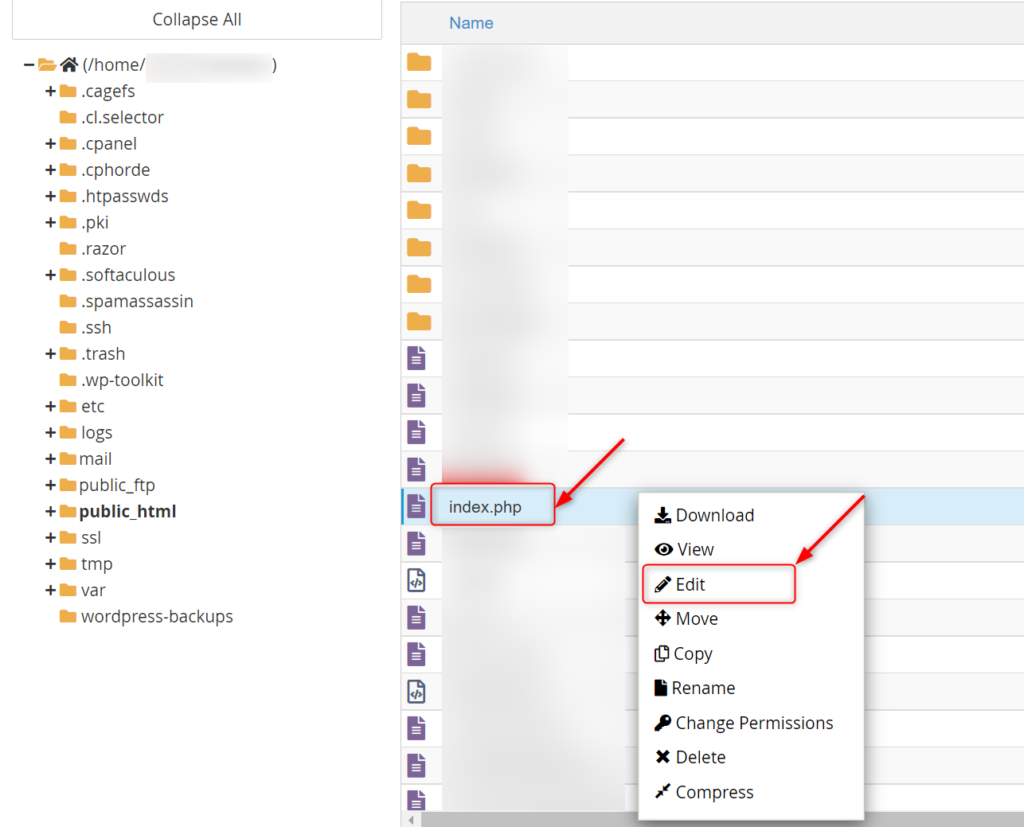
- Replace the existing code with the below mentioned:
require __DIR__.'/../bootstrap/autoload.php';
$app = require_once __DIR__.'/../bootstrap/app.php';
to:
require __DIR__.'/bootstrap/autoload.php';
$app = require_once __DIR__.'/bootstrap/app.php';
- Go back to the main cPanel page and click on MySQL Database Wizard to create a database.

- Follow the ongoing instructions to create the database user and assign them privileges.

- Go back to the main cPanel page and click on phpMyAdmin.

- Click on the newly created database name from the left panel of phpMyAdmin.
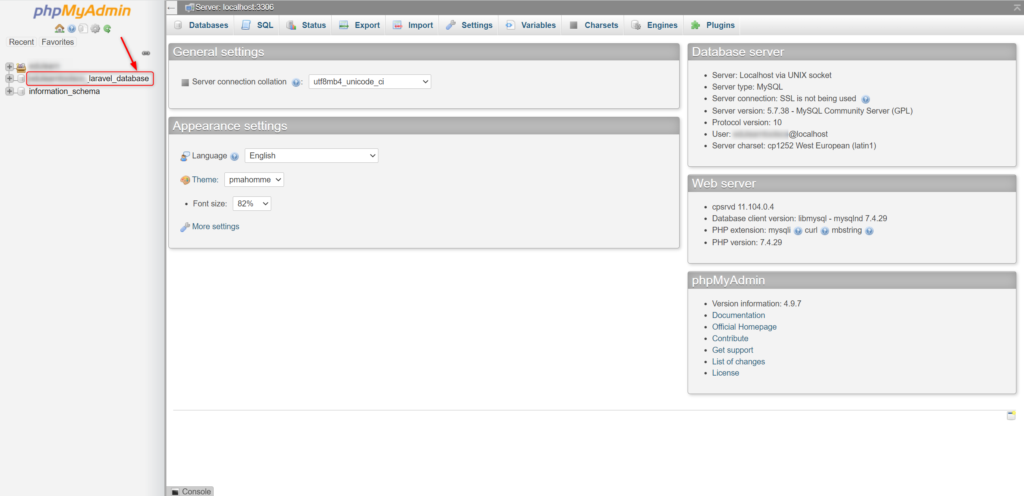
- Click on the Import option and Browse your computer to import the .sql file.
- Go to the public_html folder and right-click on .env file to edit and connect the imported database with the following details:
DB_CONNECTION=mysql DB_HOST=127.0.0.1 DB_PORT=3306 DB_DATABASE=type your database name DB_USERNAME=type your database username DB_PASSWORD=type your database password
The last step is to create a Storage Link. The actual link won’t work because we have moved the Laravel project from a local host to shared hosting. So we must delete the actual /storage folder and create a new one. As mentioned earlier, many shared hosting doesn’t provide an SSH terminal; therefore, we cannot run the artisan command to create the Storage Link. The alternate way is to use the Cron Jobs option in shared hosting.
- Go to cPanel once again and click on Cron Jobs.

ln -s /home/laravel_project_name /storage/app/public /home/laravel_project_name/public_html/storage
The above script is just an example of creating a Storage Link folder. For further details on How to use Cron Jobs with Laravel, kindly visit our Blog.
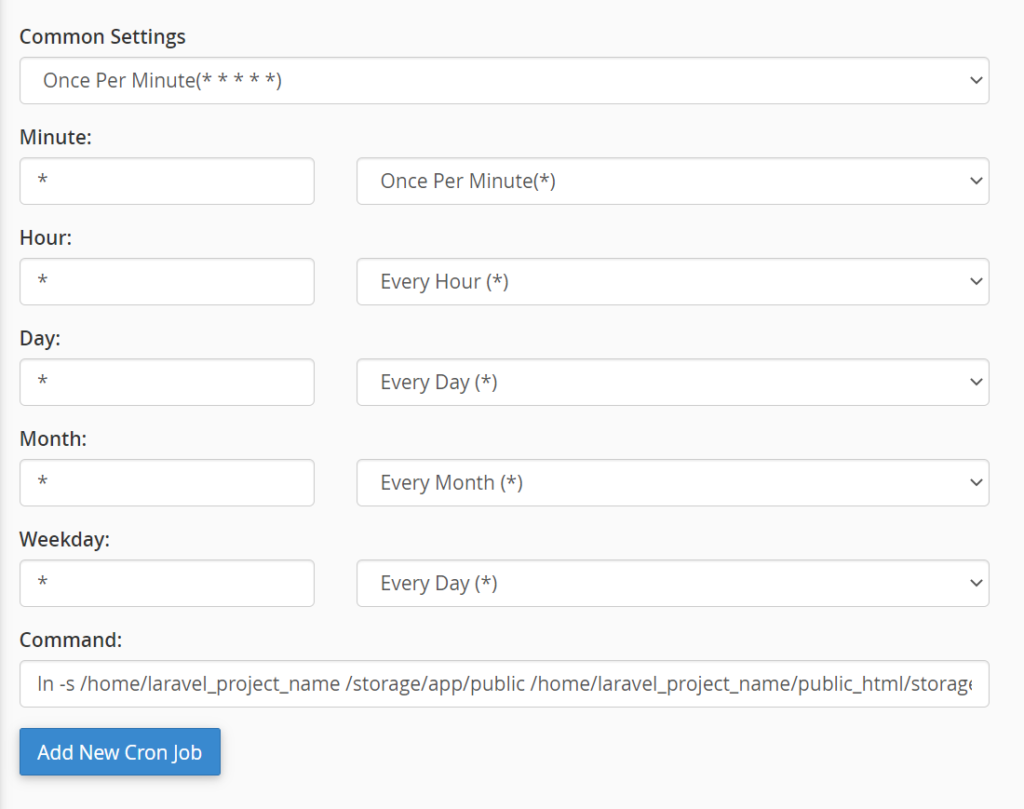
The last step is to protect .htaccess and .env files from direct access.
- Right-click on the .htaccess file and add the below mentioned code:
#disable directory browsing
Options -Indexes
#PROTECT ENV FILE
<Files .env>
order allow,deny
Deny from all
</Files>
#PROTECT ENV FILE
<Files .htaccess>
order allow,deny
Deny from all
</Files>
Things You Should Look for in a web hosting
1) High Performance
Web hosting should provide consistently high performance by allocating the required server resources and properly configuring the software services.
The hosting company must use industry leading-infrastructure provider servers with SSD storage for high performance and ensure the proper use of resources by optimizing the Tech Stack according to application. Additionally, the server hardware foundation will impact your site’s speed, so look for a better web host with low-density servers, premium server hardware, and multiple caching layers.
2) Uptime Guarantee
It’s generally assumed that 99.9% uptime is a hosting industry standard, and many web hosts offer a service-level agreement (SLA) of a 99.9% uptime guarantee, which assures that their website will not be down for an extended period of time and commits the host to a refund if a customer experiences downtime.
Downtime on your website means not just losing money but also losing the trust of your clients and prospects. Always look for a dependable host with a service level agreement (SLA) that specifies the maximum amount of downtime consumers may expect.
3) Fully Secure
A web hosting provider must ensure server-level security protection against any type of cyber threat. The server must be protected using a hardware firewall, OS Shorewall, and automated blocking of brute force attacks to gain SSH, SFTP and database access.
Provide an option to easily deploy your access policy on SSH, SFTP and database connections. Also, allow adding and deleting the external and internal connection on any port with the desired access policy.
For data encrypted data communication between a hosting server and user browser, you can install a custom SSL certificate or free SSL certificate provided by the hosting provider.
4) Full Freedom
There is no more incredible feeling than being free. There are a lot of hosting providers out there that offer different levels of freedom and flexibility; however, not all of them are equal. When you’re looking for a hosting provider that offers full freedom, you must be sure that they don’t restrict the features based on pricing, limitation of the customization options or server use, no usage commitment or upfront fee.
Be sure to research and find one like Devrims that offers the freedom and flexibility you need to build the website you’ve always wanted.
5) Easy Management
Always look for web hosting that offers easy hosting management. With this, you can quickly and easily manage your hosting environment in a few clicks, easy-to-use interface, monitor server performance, manage user accounts, and perform other administrative tasks with various built-in tools that make it even easier to keep your server running smoothly.
6) Fully Customizable
A web hosting provider should have fully customizable servers that provide you with the ability to tailor the hosting environment to your specific needs and requirements. This means you can install any software you need and configure the server to your liking.
This flexibility is ideal for businesses that need to run custom applications or for those who want to have high control over their hosting environment.
7) Pay Back Policy in SLA
As part of a web hosting Service Level Agreement (SLA), they should have a payback policy in place to ensure that their customers are always satisfied with their services.
If, for any reason, there is a failure in the fulfillment of the defined service standards as per the SLA customer can claim SLA credit, adjustments, or compensation of any kind.
8) 24/7 Support
Web hosting must offer 24/7 support so you can always get the assistance you need when you want it. For high-priority issues, chat support is very fruitful, and for any new requirement that needs more than an hour to resolve, ticket support will be helpful in this case.
If you need help, the team should always be available. You can always contact support without waiting in a long queue.
Shared Laravel Hosting vs. Managed Laravel Hosting
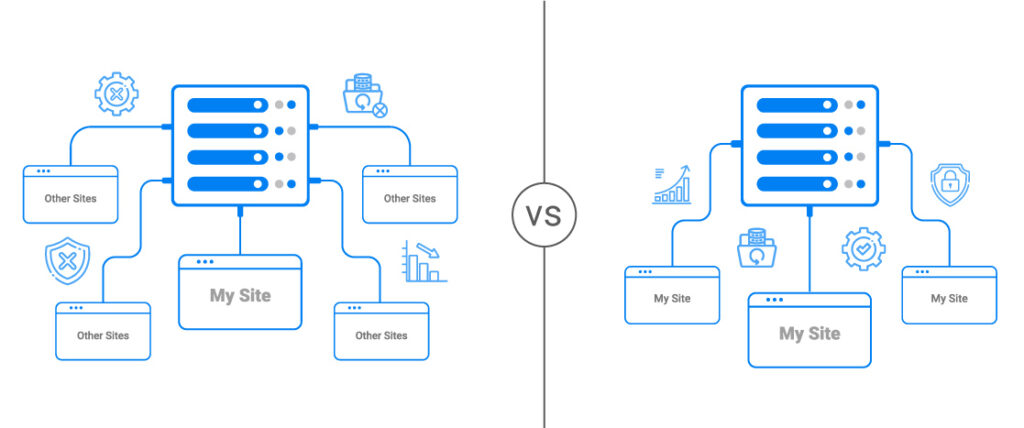
Since we have discussed all the pros and cons of Laravel shared hosting and what features you should look for before buying the hosting service. Now in this section, I will compare the laravel shared hosting with Managed Laravel hosting in a very concise manner.
| S# | SHARED LARAVEL HOSTING | MANAGED LARAVEL HOSTING | |
| 1 | Performance | LOW | HIGH |
| 2 | Reliability | Less Reliable | Highly Reliable |
| 3 | Availability | Very Cheap | High Cost |
| 4 | Security | X | √ |
| 5 | Scalable | X | √ |
| 6 | Easy-To-Manage | X | √ |
| 7 | Customization | X | √ |
| 8 | Automated Backups | X | √ |
| 9 | Customer Support | No Support or Limited | 24/7 Chat & Ticket Support |
| 10 | Usage Commitment | Monthly or Yearly | Pay-As-You-Go |
| 11 | Cost | Low Cost with Upfornt Charges | High Cost with Post-Paid |
Managed Cloud Hosting is the Best Option
Managed Cloud Hosting is the best option if you’re looking for a robust, secure, scalable, and reliable hosting solution for your Laravel application. With a Managed Cloud Host, you’ll get all the benefits of the cloud – including scalability, hourly-based pricing, flexibility, and reliability – without worrying about server management and hosting issues.
Your hosting provider will take care of all the tasks associated with keeping your Laravel application and cloud infrastructure up and running, including server maintenance, security updates, and performance tuning. This will free up your time so that you can focus on developing your application and growing your business.
Moreover, Managed Cloud Hosting is often more cost-effective than self-managed hosting, as you save a lot of time and resources. A Managed Cloud Host will provide you with expert support whenever you need it. If you run into any problems, your host will be there to help you troubleshoot and resolve them. This peace of mind is invaluable and something you can’t get with a self-managed hosting solution.
So if you’re looking for the best server for Laravel application, consider a Managed Cloud Host. You won’t be disappointed.
Why Devrims Laravel Hosting is the Right Choice
Devrims Managed Cloud Hosting Platform revolutionized the features of managed cloud hosting industry. We have created a robust, scalable, secure, customizable cloud hosting infrastructure for hosting Laravel applications and other Php-based CMS.
With the help of our industry-leading cloud infrastructure partners – Amazon Web Services and DigitalOcean, we provide an option to host laravel on your favorite cloud provider. We have ultra-fast dedicated cloud servers where you can install Laravel in a single click with complete freedom to choose the Tech Stack, software services, server location and size. And all this happens in a few clicks. Also, our platform is smart intelligent to suggest the best Tech Stack and software services based on your Laravel version. Some of our features are:
- Dedicated Cloud Servers
- One Click Application Installation
- Pre-configured and optimize Tech Stack
- Advanced Firewall Security
- Real-Time Monitoring
- 9% Uptime Guaranteed
- One Click Server Scaling
- Server-Level Caching
- Multiple PHP version in a Single Server
- Multiple Database Services and databases
- Unlimited Applications in a Server
- Unlimited Domain Names
- Unlimited SSL Certificate
- Pay-As-You-Go Plans
- Expert 24/7 Support
Devrims offers 6 Days Free Trial Account without adding any payment details or feature restrictions, so I suggest you avail Free Trial Account and experience true Manage Cloud Hosting.
Blazing Fast Laravel Hosting
Wrapping Up!
As I mentioned at the start of this blog, choosing the right hosting provider is based on price and features. Now you know in detail about the required features, the downside of laravel shared hosting, and your hosting budget.
I hope this blog will help in selecting the Laravel hosting provider. If you have any further questions and want to know more about Devrims Laravel Web Hosting, our support engineers are available 24/7 to assist you.
Thank you for reading this article. Share your thoughts on what you think about Shared and Managed Cloud Hosting in the comment section.
Frequently Ask Questions
What is Laravel hosting?
Laravel hosting is a process of deploying a Laravel framework written on Php language with MVC architecture. The hosting comes with the deployment of the database, Php-fpm and web service with other required configurations in the Php.ini file for Php and my.cnf file for MySQL to run the application globally using the domain name smoothly.
The hosting provider offers automatic deployment of the PHP Laravel Framework and other required services and packages on the hosting server, with many additional features to manage the laravel hosting server.
Which hosting is best for Laravel projects?
Managed Laravel Hosting is the best solution because it provides complete features from website migration to performance enhancement and then management and monitoring of the website.
To save time and peace of mind, you should go for Managed Cloud Hosting. In a few clicks, you can install the Laravel application on a dedicated cloud server with a staging URL to test the application after migration. It also provides free website migration with 24/7 support.
How can I host Laravel for free?
Unfortunately, no hosting provider offers free Laravel hosting. With Devrims, you can host your Laravel application for FREE in a 6 Days Free trial with no feature restrictions or payment details, so you may test our services and migrate your application. If our platform satisfies your expectations, you can switch your trial account to a paid account by adding payment details.
What are the hosting requirements for Laravel?
To host Laravel application, you need a server with storage and desired network from the hardware side. The size of hardware resources - RAM, CPU, Storage and Bandwidth Speed depend entirely on the traffic load, the amount of processing required by your applications, and so on.
Laravel supports Nginx or Apache as a web service, MySQL or MariaDB as a Database, and Php as a backend language. Any operating system that supports these software services can be used; most users use a Linux distribution.
You must ensure that your server meets the following specifications:
- PHP >= 7.1.3
- OpenSSL PHP Extension
- PDO PHP Extension
- Mbstring PHP Extension
- Tokenizer PHP Extension
- XML PHP Extension
- Ctype PHP Extension
- JSON PHP Extension
Which server is used by Laravel?
Well, it depends on how you have developed the Laravel application, the architecture of your application, and the website traffic. We recommend hosting the Laravel app on a 1vCPU and 2GB RAM server with a choice of Apache or Nginx web server.
How do I host Laravel 8 on shared hosting?
- Create a zip, tar, tar.gz compressed file of your Laravel project folder.
- Log in to your cPanel to deploy the Laravel 8 project on shared hosting.
- Click on File Manager > public_html > Upload
- Select the compressed file to upload inside the public_html root directory
- Extract the compressed file inside the public_html folder
- Open and update the existing php file with the below code:
require __DIR__.'/../bootstrap/autoload.php';
$app = require_once __DIR__.'/../bootstrap/app.php';
to:
require __DIR__.'/bootstrap/autoload.php';
$app = require_once __DIR__.'/bootstrap/app.php';
- Go back to the main cPanel page and click on MySQL Database Wizard.
- Follow the ongoing instructions to create the database user and assign them privileges.
- Go back to the main cPanel page and click on phpMyAdmin.
- Click on the newly created database name from the left panel of phpMyAdmin.
- Click on the Import option and Browse your computer to import the .sql file.
- Go to the public_html folder and edit the .env file to connect the imported database with the following details:
DB_CONNECTION=mysql
DB_HOST=127.0.0.1
DB_PORT=3306
DB_DATABASE=type your database name
DB_USERNAME=type your database username
DB_PASSWORD=type your database password
- Go to cPanel again and click on Cron Jobs to create the Storage Link
Note: Add a cron job as per your requirement with the script to as mentioned below for an example:
ln -s /home/laravel_project_name /storage/app/public /home/laravel_project_name/public_html/storage
- The last step is to protect .htaccess and .env files from direct access. Right-click on the .htaccess file and add the below mentioned code:
#disable directory browsing
Options -Indexes
#PROTECT ENV FILE
<Files .env>
order allow,deny
Deny from all
</Files>
#PROTECT ENV FILE
<Files .htaccess>
order allow,deny
Deny from all
</Files>
How to solve the Laravel error 500?
There are a few possible reasons for 500 errors:
- Check if you have assigned proper file and folder permissions.
- Check for the Environment variables.
- Create the .env file if not found inside the root directory.
- Install Php extensions that are needed for your Laravel project.
- Check the Database credentials and assign proper privileges.
Why Laravel doesn’t work with shared hosting?
The main disadvantages of hosting Laravel on shared hosting are security and performance because the security vulnerability of one website can affect the other website on the same server. Shared hosting hosts multiple websites on a single server resulting the poor performance, security issues, availability issues, and no customization with limited features. Also does not meet the minimum requirements to deploy Laravel apps such as Php versions, OpenSSL Php Extension, use of Composer, SSH Terminal, etc.
It is highly recommended for the Laravel project to use Managed Laravel Cloud Hosting because you do not have to worry about managing the servers and have complete freedom over services and features.




